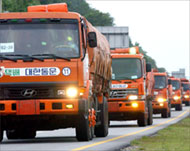Signs of progress in N Korea talks
Six-party talks aimed at ending the crisis over North Korea’s nuclear ambitions enter a second day in Beijing on Wednesday amid positive signs from Washington and Pyongyang that have raised hopes for progress.

The atmosphere surrounding the long-delayed fourth round of discussions among the two Koreas, the United States, Russia, Japan and China has been upbeat, but few expect a breakthrough.
The United States held rare one-on-one meetings with North Korea on Monday and Tuesday, taking a less confrontational approach to talks that have dragged on for nearly three years.
US negotiator Christopher Hill offered reassurances that Washington regarded the North, once considered part of its “axis of evil”, as a sovereign state which it would not attack.
Despite the upbeat signals, distrust is still great and the stakes are high. A North Korean source told Russia’s Interfax news agency on Tuesday that major disagreements remained.
Conditions
The United States stood by its position that improved ties, security guarantees and energy aid could only come after North Korea scrapped its nuclear weapons programmes, the source said.
 |
|
Representatives from the six |
US State Department spokesman Sean McCormack said in Washington on Tuesday: “You are seeing a seriousness of purpose on our part, and we detect that as well from the other members of the six-party talks…including North Korea.”
“…We hope to make progress in this round of talks. Progress would mean that we see enough in these talks that would merit all the parties agreeing that we would come back for another round,” he told reporters.
Chinese delegation spokesman Qin Gang called the first day of talks a “sound foundation” but quoted Foreign Minister Li Zhaoxing as saying the participants still faced hard issues dating back to their Cold War past.
Previous rounds
The talks may be coloured by evening briefings by negotiators and their home countries, particularly North Korea, where the ultimate decisions are made by leader Kim Jong-il.
Three previous rounds saw no progress, and Japan warned that failure to gain concrete results this time would call the credibility of the talks into question.
 |
|
Trucks carry 1500 tons of rice from |
Stalemate might prompt Washington to take the issue to the United Nations and open debate on possible sanctions, which China opposes and North Korea has warned would trigger conflict.
Japan raised on Tuesday the thorny issue of North Korea’s abduction of Japanese citizens decades ago, an issue that could prove a bar to progress. Pyongyang insists the case is closed and has warned Japan any attempt to raise the issue in Beijing would disrupt the nuclear talks.
If the talks go well, the rewards could help the impoverished North out of isolation and offer aid at a time when the World Food Programme is warning of a worsening food crisis.
The United States told North Korea informally last month that it could consider setting up a liaison office in Pyongyang as a first step towards normalising relations if North Korea scrapped its nuclear programmes, Japan’s Kyodo news agency said.
Nuclear standoff
South Korea said its offer to supply Pyongyang with 2000 megawatts of electricity, roughly equivalent to the North’s total power output, if it scrapped its nuclear plans, could be key to resolving the crisis.
The nuclear standoff erupted in October 2002 when US officials accused Pyongyang of pursuing a clandestine weapons programme. The North expelled nuclear inspectors and withdrew from the Non-Proliferation Treaty.
Early this year Pyongyang announced it possessed nuclear weapons and demanded Washington provide aid, security guarantees and diplomatic recognition in return for scrapping them.